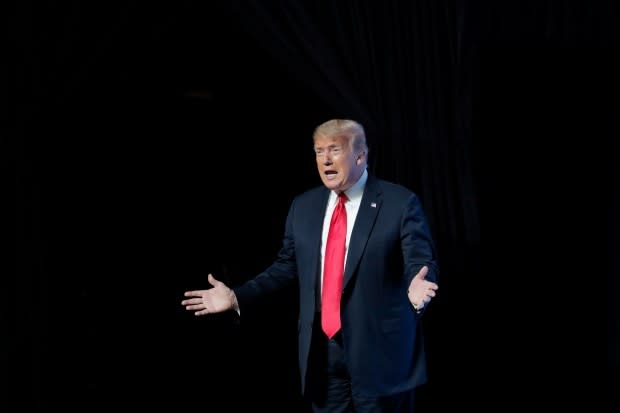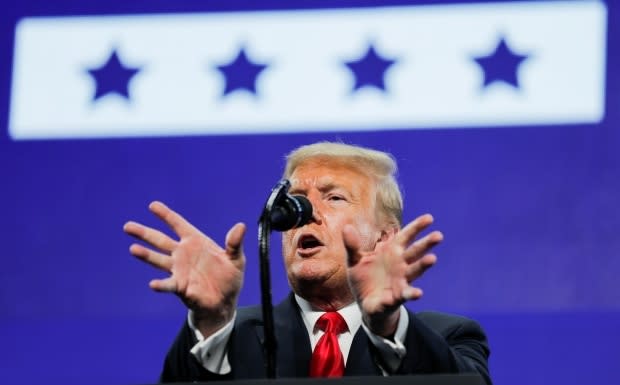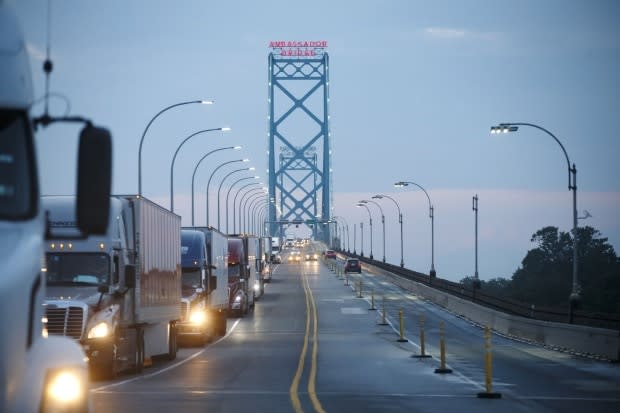Canadian workers exempt from Trump's migration clampdown, lawyers say

Canadians are being exempted from U.S. President Donald Trump's halt on certain work visas, immigration lawyers said Wednesday evening in a development that could affect thousands of cross-border workers.
News that the U.S. is slamming its door shut on broad categories of foreign professionals has triggered mass confusion around the world for businesses, workers and their families.
But it appears there's a partial loophole for Canadians.
The American Immigration Lawyers Association informed members that it had received assurances from U.S. Customs and Border Protection that all border posts were instructed to exempt Canadians from this week's order.
The executive order announced Monday by Trump suspends, at least for the rest of this year, entry of workers under several popular visa categories (H, J and L), upending hundreds of thousands of lives and businesses around the world — and potentially several thousand in Canada.
From the outset, some lawyers had suspected the wording exempted Canadians but were unsure, and the confusion was compounded by different interpretations of the order from one border post to the next.
On Wednesday, the lawyers' association said it received clearer assurances from the U.S. government.
"Fortunately, [U.S. Customs and Border Protection headquarters] has now confirmed that the proclamation does not apply to Canadian citizens and has apparently informed the local ports of entry of this fact," said Henry Chang, a Toronto-based expert on U.S. immigration law at the law firm Dentons.
"So the issue appears to be resolved, at least for Canadian citizens."
Another immigration expert, speaking earlier this week, predicted a period of uncertainty.
"It's going to be a little chaotic for a while," said Theresa Cardinal Brown, a former U.S. Homeland Security official and immigration expert once posted at the American Embassy in Ottawa
The fine print in Trump's order
The potential Canadian loophole is in Section 3 of the order. That section says the visa ban only applies to people currently outside the U.S. who lack a valid visa or travel document. It so happens that most Canadians already have a valid travel document to the U.S.
It's called a passport.
WATCH | COVID-19 cases rise in U.S. south, west:
An American immigration lawyer said that's a distinction not shared by most citizens of other countries, who generally need a visa or visa waiver to enter the U.S.
"Canadian citizens are unique in the world," said Danielle Rizzo, a partner at the Harris Beach law firm in Buffalo, N.Y., and former head of liaison between U.S. Customs and the American Immigration Lawyers Association.
Speaking earlier this week, Rizzo said that's why she anticipated an exemption for Canadians.
Trump's order constitutes a significant escalation of his immigration-curbing policies.
He cast it as a measure to protect 525,000 American jobs from foreign competition amid a pandemic that has wiped out more than 18 million jobs in the country.
An American 'tragedy'
But to one former immigration official in the Obama White House, this is a heartbreaking moment in U.S. history.
"I think this is a tragedy," said Doug Rand, who now runs a company, Boundless Immigration, that helps immigrants obtain U.S. residency and citizenship.
"And it's a huge self-inflicted wound for this country — in terms of our values, our economy and our ability to overcome this pandemic."
He said that Trump has progressively chipped away at visa rules to make it more difficult to immigrate and that it has caused one friend, a PhD in biomedical sciences, to move to Canada.
"Good job, Canada," Rand said.

A Harvard business professor published a paper this spring warning that the U.S.'s out-of-date immigration system, which has not been reformed in decades, risks sapping the country of its great historical advantage in drawing top talent.
Trump has repeatedly said he wants to reform the system to prioritize skilled labour, like Canada's points system.
But there's no sign of any such legislation passing Congress, and what Trump has mostly done instead is tighten existing policies by executive order, culminating in this week's.
In crisis, some Canadians see opportunity
Now, as in any crisis, some see opportunity.
Canadian tech companies are signalling their intention to recruit some of the workers now barred from the U.S.
Canada had, before the pandemic struck, experienced a historic population boom, fuelled by foreign students and skilled workers. The OECD credited policies created by successive governments in Ottawa a role model.
One immigrant to Canada is now working to take advantage of Trump's executive order.
Ilya Brotzky came to Canada from the former Soviet Union when he was five, accompanying his mother, a horticultural engineer.
He now runs VanHack, which has 32 employees, mostly in Canada, that has recruited 600 tech workers from India and South America on behalf of companies looking to expand Canadian operations.
Brotzky said he's begun talking to colleagues about how to track down and recruit people who have been shut out of the U.S.

He said many of these people will be hired by the exact same companies and will work remotely outside the U.S. — and make money and pay taxes outside the U.S.
"These are highly skilled, coveted workers who have a lot to contribute," said the Vancouver-based entrepreneur.
"I think it'll hurt the U.S."
One thing he wonders is whether Trump's announcement was a mere election-year political stunt.
After all, during the pandemic, U.S. government offices are being shuttered and immigration applications have slowed to a trickle.
But Rizzo said companies are still moving people around.
What happens next?
She said she's still processing L visa applications for Canadian intra-company transfers during this pandemic and has reason to hope it will continue.
One Montreal lawyer who specializes in U.S. immigration, Andrea Vaitzner, said it would be a serious mistake for the U.S. to halt L-1 visas, used for transfers of executives between company offices.
"It would be a huge blow to businesses," said Vaitzner, who works at Norton Rose Fulbright.
"[These executives] travel intermittently to the U.S. to do work at their company's U.S. office or to visit [customers, suppliers and partners]. I do not understand how banning Canadian L-1 applicants from entering the U.S. would alleviate the unemployment rate in the U.S."


